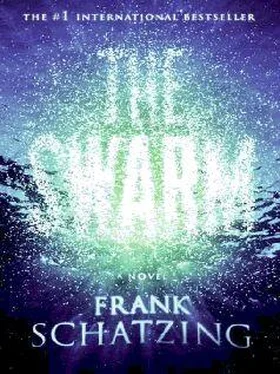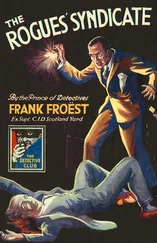THE SWARM
A Novel of the Deep
by Frank Schatzing
Love, deeper than the ocean. For Sabina
hishuk ish ts'awalk
Nuu-chah-nulth tribe, Vancouver Island
Huanchaco, Peruvian Coast
Juan Narciso Ucañan went to his fate that Wednesday, and no one even noticed.
A few weeks later the circumstances surrounding his sudden disappearance sent shockwaves around the globe, but Ucañan's name wasn't mentioned. He was one of many, too many. What he'd experienced in the early hours of that morning had been going on elsewhere all over the world. The parallels were striking – once you knew what had happened, and only Ucañan did. Maybe the fisherman, with his simple way of seeing things, had even sensed the more complex connections, but in the absence of his evidence, the mystery went unsolved. Neither he nor the Pacific Ocean on the Huanchaco coast in the north of Peru gave anything away. Like the fish he caught in his lifetime, Juan Xarciso Ucañan stayed silent. When he next showed up, he was just a statistic. No one had time to wonder about his whereabouts: events had entered a new and graver phase.
Not that anyone had ever shown much interest in him anyway, even before 14 January.
At least, that was how Ucañan saw it. He'd never been able to reconcile himself with his village's reincarnation as an international beach resort. For the tourists, Huanchaco was a time-forgotten paradise where locals went fishing in old-fashioned boats. But what use was that to him? To own a fishing-boat at all was old-fashioned. These days, most of his countrymen earned their living on factory trawlers or in the fishmeal and fish-oil industries. Peru's fish stock was dwindling, but its fishing industry was still one of the largest in the world, on a par with Chile, Russia, the US and parts of Asia. Even the threat of El Niño hadn't stopped the coastal city of Huanchaco sprawling out in every direction, the last preserves of nature sacrificed to make way for row after row of hotels. In the end nearly everyone had profited one way or another. Only Ucañan was left with nothing, just his boat, a cabaUito de totora , or 'reed pony', as the admiring conquistadors had called the distinctive craft. But the way things were going, the pretty little vessels would soon he gone too.
The new millennium had decided to pick on Ucañan.
His emotions were already starting to get the better of him. At times he felt as though he was being punished – by El Niño, which had plagued Peru since the beginning of history and that he was helpless to prevent, and by the environmentalists, whose talk of overfishing had set the politicians searching for a culprit, until in the end they realised they were looking for themselves. So they'd shifted their focus from the fisheries to Ucañan, who couldn't be held responsible for the environmental mess. He hadn't asked for the floating factories, or for the Japanese and Korean trawlers lurking on the 200-mile boundary, waiting to tow away the fish. None of this was Ucañan's fault, but even he no longer believed it. That was the other thing he couldn't help feeling – guilty. As though he was the one who'd pulled millions of tonnes of mackerel and tuna from the sea.
He was twenty-eight years old and one of the last of his kind.
His five elder brothers all worked in Lima, and thought he was a fool because he clung to a boat no better than a surfboard, waiting doggedly in deserted waters for the mackerel and bonito to return. 'You won't find life among the dead,' they told him. But it was his father who worried Ucañan. The old man was nearly seventy and had set sail every day, right up until a few weeks previously. Now Ucañan the elder no longer went fishing. Bedridden, his face covered with blotches, he had a nasty cough and seemed to be losing his mind. Juan Narciso clung to the hope that by continuing the family tradition he could keep the old man alive.
For over a thousand years Ucañan's people, the Yunga and the Moche, had been fishing in reed boats. Long before the Spanish arrived, they had settled along the Peruvian coast from the northern reaches to modern-day Pisco, supplying the immense metropolis of Chan Chan with fish. Back then the area had been rich in wachaques , coastal marshes fed by fresh water from underground springs. Vast quantities of reed grass had grown there – the totora that Ucañan and the other remaining fishermen still used to make their caballitos , in the manner of their forebears. It required skill and inner calm. There were no other boats quite like them. Measuring three to four metres long, with an upward-curving prow and light as a feather, they were practically unsinkable. In days gone by thousands of caballitos had cut through the waves of the 'Golden Fish' coast, named at a time when even the worst catches brought more fish than Ucañan could ever dream of.
Eventually the marshes had vanished and so, too, the reeds.
At least you could count on El Niño. Every few years around Christmas time the trade winds would slacken and the cool Humboldt Current would warm up, destroying the feed and scattering the hungry mackerel, bonito and sardines. Ucañan's forefathers had called it El Niño – the Christ-child. Sometimes it was content just to shake things up, but every fourth or fifth year it would wreak God's vengeance on the people as though it was trying to wipe them from the Earth. Whirlwinds, thirty-times the normal rainfall and murderous mudslides – on each occasion hundreds were killed. El Niño came and went, as it always had done. No one welcomed it, but they managed to get by. These days, though, even prayers couldn't help them: the nets that robbed the Pacific of its riches were wide enough to capture twelve jumbo jets at once.
Maybe, thought Ucañan, as his caballito bobbed up and down on the swell, maybe I am a fool. Foolish and guilty. Guilty like the rest of them for trusting in a patron saint who'd never done anything about El Niño, the fisheries or international law.
In the old days, he thought, we had shamans in Peru. Ucañan knew the stories about what the archaeologists had discovered in the pre-Columbian temples near the city of Trujillo, behind the Pyramid of the Moon. Ninety skeletons had been found there, men, women and children, killed with a blow to the head or stabbed with a spear. In a desperate attempt to stop the flood waters of ad 560 the high priests had sacrificed the lives of ninety to their gods, and El Niño had gone.
Whom would they have to sacrifice to stop to the overfishing?
Ucañan shivered. He was a good Christian: he loved Christ and St Peter, the patron saint of fishermen. He always put his heart and soul into the festival of San Pedro, when a wooden effigy of the saint was paddled by boat from village to village. And yet… In the morning the churches were full, but the real fires burned at night. Shamanism was as strong as ever – but how could any god help them when even the Christ-child refused to intervene? Trying to control the forces of nature was exhausting enough, apparently, without attempting to cure the fishermen's latest woes. That was a matter for the politicians and lobbyists.
Ucafian squinted up at the sky.
It was going to he a beautiful day.
At moments like this, north-western Peru looked picture-perfect. There hadn't been a cloud for days. The surfers weren't up yet. Ucafian and a dozen or so other fishermen had set off some thirty minutes earlier, paddling their caballitos in the darkness over the undulating waves. The sun was slowly starting to peep out from behind the mist-shrouded mountains, bathing the sea in its pastel yellow light. Only moments before the vast expanse of water had looked silver; now it turned a delicate blue. In the distance you could just make out the silhouettes of mighty cargo ships as they headed for Lima.
Читать дальше












